"A Canadian breed the world loves!"
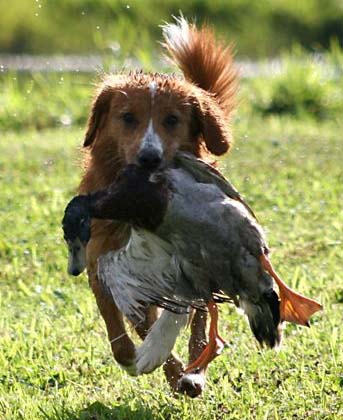 At Tollchester we specialize in canine care, phsycology, pre-natal, post-natal and infant care/developement. We are extremely proud of the high quality puppies our breeding program has produced. As advocates of the breed we have had the joy of travelling to other parts of the world to study the breed. We have met many wonderful people and enjoy sharing our pedigree's world wide!
At Tollchester we specialize in canine care, phsycology, pre-natal, post-natal and infant care/developement. We are extremely proud of the high quality puppies our breeding program has produced. As advocates of the breed we have had the joy of travelling to other parts of the world to study the breed. We have met many wonderful people and enjoy sharing our pedigree's world wide!
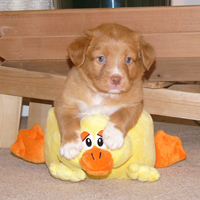 Tollchester is a permanently registered breeder with the CKC. Having permenant registration of our kennel name with the Canadian Kennel Club means we have owned the Tollchester kennel name for over 10 years! As premier permanently registered members and breeders of the Canadian Kennel Club we believe in continued education that is why we attend numerous seminars/workshops on the art and science of breeding dogs, including those of reproductive experts Myra Savant Harris, Carmen L Battagalia, Robert Hutchison and Claudia Orlandi Ph.d. Continous education ensures we are up to date on the latest breeding, whelping and raising techniqes to produce the 'perfect' puppy.
Tollchester is a permanently registered breeder with the CKC. Having permenant registration of our kennel name with the Canadian Kennel Club means we have owned the Tollchester kennel name for over 10 years! As premier permanently registered members and breeders of the Canadian Kennel Club we believe in continued education that is why we attend numerous seminars/workshops on the art and science of breeding dogs, including those of reproductive experts Myra Savant Harris, Carmen L Battagalia, Robert Hutchison and Claudia Orlandi Ph.d. Continous education ensures we are up to date on the latest breeding, whelping and raising techniqes to produce the 'perfect' puppy. We strongly believe Tollers should be versatile family dogs. This is why exceptional health, temperament, soundness, working aptitude and breed type are all of utmost importance to us when making a decision on a breeding.
We believe breeding should consist of a community of people who care for the breed and do their best to educate others. We support mentorship programs for breeding and believe every breeder (both experienced or not) should have a community of dog people. At Tollchester all of our toller owners are part of our family and our community. We keep in contact with our puppy buyers and host get togethers to encourage owners to take part in events - picnics, bbq's, dog shows, gatherings, etc...
For our breeding program, we've set very high objectives. Our number one goal is the production of healthy, sound toller puppies with ideal temperaments and conformation. Every breeding is planned months in advance with the ambition of producing top quality show dogs that possess the ability to 'work'. A wise person once told me "breeders should never breed dogs that aren't needed for their breeding program. All breedings should be done with the same goal in mind, to produce top quality dogs you the breeder would want to keep" Therefor whether your dog will be show, in obedience, agility, hunting, earth trials, lure coursing or family dog, each litter is produced with the same aspiration in mind - to produce sound dogs both body and mind who can preform their 'job'.
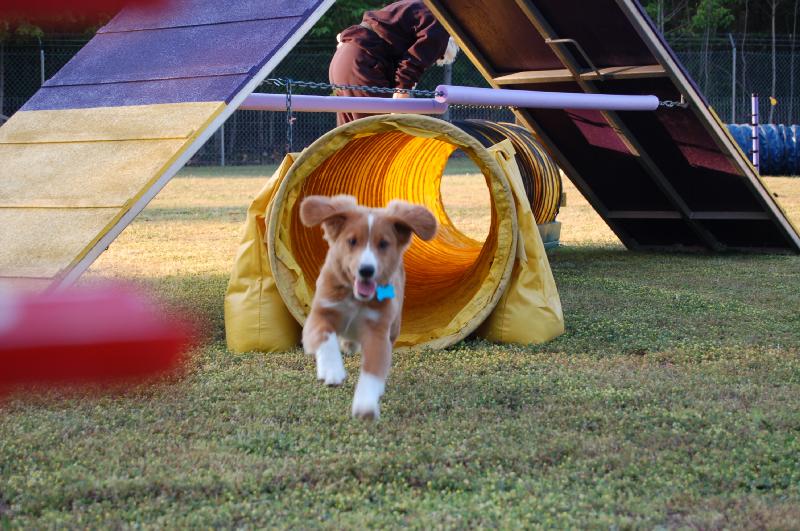 All our litters raised at Tollchester are whelped in our home and are raised 'underfoot' until they are ready to go to their new homes between 9-16 weeks of age. Puppies are socialized with other dogs of all ages, adults and children. All puppies are started on basic retrieving, obedience, crate-training and housebreaking. We perform problem solving skill testing, puppy aptitude testing, structure evaluations, temperament testing and host puppy play days for our puppies, prior to placing them in their new homes. Our puppy aptitude tests are to make sure the right puppy goes to the right home.
All our litters raised at Tollchester are whelped in our home and are raised 'underfoot' until they are ready to go to their new homes between 9-16 weeks of age. Puppies are socialized with other dogs of all ages, adults and children. All puppies are started on basic retrieving, obedience, crate-training and housebreaking. We perform problem solving skill testing, puppy aptitude testing, structure evaluations, temperament testing and host puppy play days for our puppies, prior to placing them in their new homes. Our puppy aptitude tests are to make sure the right puppy goes to the right home.
At Tollchester many of our mothers live at their co-owners/foster family a majority of the year and come to Tollchester for vaccations, dog shows and whelping. For our mothers we have set up a room in our home for the 'Puppy Nursery' which gives the new mother some privacy. This room is set up with heated floors to keep the room at a ideal tempeture and is furnished with a comfortable whelping area with soft and cuddly bedding for the newborn puppies comfort.
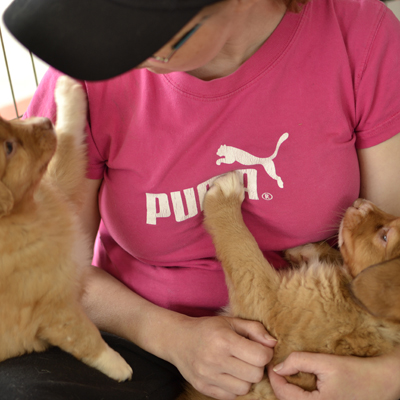 We believe in excessive handling of puppies to mold them into versitile adults. This is why all our Nova Scotia Duck Tolling Retriever puppies born at Tollchester are raised with "Early Neurological Stimulation" also known as the "Bio Sensor program" or "Super Puppy program". By following the methods of stimulations written by Carmen L Battagalia we strive for the production of better puppies. The five benefits have been noted from this type of stimulation include, stronger heart beats, stronger adrenal glands, more tolerance to stress and greater resistance to disease.
We believe in excessive handling of puppies to mold them into versitile adults. This is why all our Nova Scotia Duck Tolling Retriever puppies born at Tollchester are raised with "Early Neurological Stimulation" also known as the "Bio Sensor program" or "Super Puppy program". By following the methods of stimulations written by Carmen L Battagalia we strive for the production of better puppies. The five benefits have been noted from this type of stimulation include, stronger heart beats, stronger adrenal glands, more tolerance to stress and greater resistance to disease.
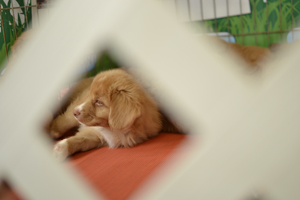 To avoid noise sensitivities we introduce all our puppies to sound socialization. The puppies will be introduced to noises such as sirens, gun fire, sounds in a vet office, sounds in a grooming shop, sounds of a kennel, dogs barking, babies crying, thunderstorms and sounds of a daycare from the day they open their ears.
To avoid noise sensitivities we introduce all our puppies to sound socialization. The puppies will be introduced to noises such as sirens, gun fire, sounds in a vet office, sounds in a grooming shop, sounds of a kennel, dogs barking, babies crying, thunderstorms and sounds of a daycare from the day they open their ears.
To encourage advanced stimulations in our puppies past the 'new born' state we follow the "Rule of Sevens" on our maturing puppies. The Rule of Seven is a socialization protocol that indicates that all puppies by the age of seven weeks should have been exposed to the following
- 7 different surfaces (carpet, concrete, wood, vinyl, grass, dirt, gravel, wood chips, etc)
- Played with at least 7 different types of objects (big balls, small balls, soft fabric toys, fuzzy toys, squeaky oys, paper or cardboard items, metal items, wooden items, leather items, milk jugs, etc)
- Been in 7 different locations (front yard, back yard, basement, kitchen, car, garage, laundry room, bathroom, crate, kennel, etc)
- Met and played with 7 new people (including men, woman, children and older adults)
- Been exposed to 7 challenges (climb on a box, climb off a box, go through a tunnel, climb steps, go down steps, climb over obstacles, play hide and seek, go in and out a doorway with a step up or down, run around a fence)
- Eaten from 7 different containers (metal, plastic, paper, china, pie plate, glass, etc)
- Heard at least 7 different loud sounds (alarm clock, whistle, siren, gun shots, radio, dinner bell, air horn, etc)
As soon as the pups start walking (around 2 weeks of age) they are started on our perfect puppy potty training program. The puppies are encourage young to stay clean and are provided with a specific area to potty. As part of this training process, they start with washable fabric pee pads as a potty area. By the time the puppies are 8 weeks they are transfered from pee pads to litter box training with wood pellets, as well as regular out door potty breaks. We have had glowing reports on the progress of our puppies as they go to their new homes. It's important to remember puppies are individuals, while some go home almost house trained, it is not uncommon for other puppies to take up to a year to be fully house trained.
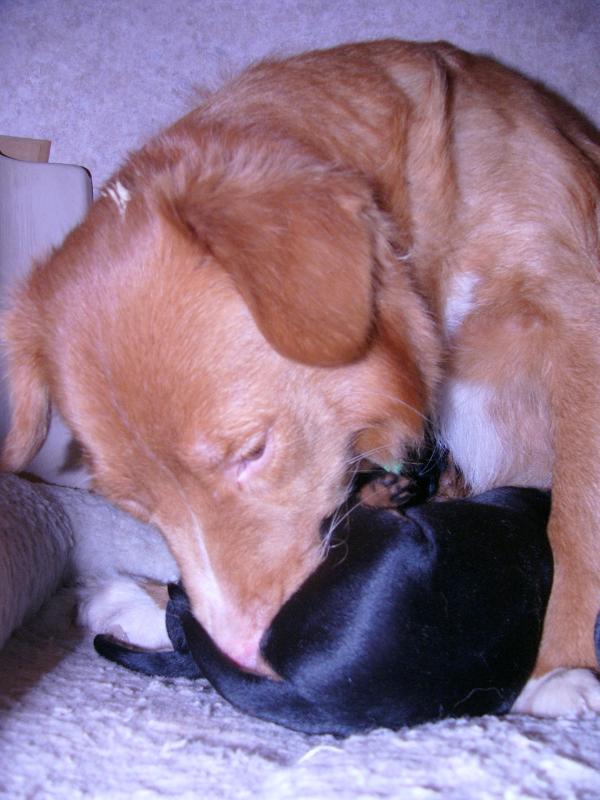
When the pups are 4-5 weeks of age they are introduced to the great out doors. Sticks, grass, mud, .....oh my, the puppies always have a grand time exploring the yard and getting into mischief. Adventure is a big part of developement so we are constantly providing them with new challenges to overcome.
When the puppies are 6 weeks of age we start crate training with short introductions to the crate during feeding. We believe in starting crate training before the puppies leave to make the transition to their new home easier on the puppy and their family.
Evaluations on the puppies temperament start at birth and continue until the puppy has their final offical evaluation at 8 weeks of age. By 4 weeks of age the puppies start to develope sleeping habits that help in determining which puppy is high, moderate/high, moderate, moderate/low and low energy. When the pups are around 6 weeks their social skills become fine tuned, we start to see how puppies learn and which puppies are better problem solvers. At this age we like to preform a trainability test to determine how each puppy learns and is motivated. By 7 weeks of age they will be showing a variety of behavioural traits. At this age they are ready for their temperament evaluation. The 7 week assessment is done following the Volhard’s Puppy Aptitude Test. This test helps determine each puppies levels of anxiety and tests their recoery time to determine how a puppy will respond to stressful events/sittuations. At 8 weeks of age, we look at external structure of each puppy to make an educated guess on how the puppy will develope as it ages. In order to do this we preform an extensive structural evaluation that we have learned from renowned Puppy Evaluator Pat Hastings. These aptitude tests assist us in picking the best puppy for your home. Of course, us playing, challenging, desensitizing, loving and other families interacting with the puppies for the previous 8-9 weeks really helps too!
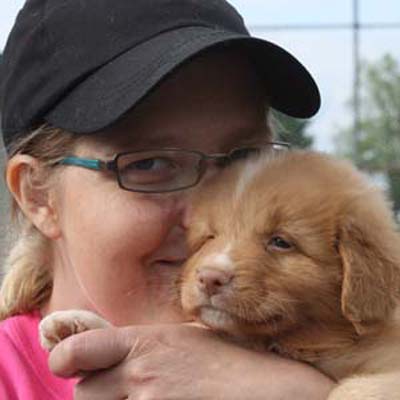 At Tollchester, we value your opinion and want your feedback during evaluations! To assist us in the puppy evaluations, we suggest at least one private visit with us and the puppies when the pups are between 4-8 weeks of age. For each litter we set up a "puppy play date" so the families can preform their own evaluation on the litter. We encourage all our homes to meet the puppies in person and engage in our evaluations of the puppies. Puppies from Tollchester go to new homes as early as 9 weeks of age, after an extensive vet check at our veterinarian.
At Tollchester, we value your opinion and want your feedback during evaluations! To assist us in the puppy evaluations, we suggest at least one private visit with us and the puppies when the pups are between 4-8 weeks of age. For each litter we set up a "puppy play date" so the families can preform their own evaluation on the litter. We encourage all our homes to meet the puppies in person and engage in our evaluations of the puppies. Puppies from Tollchester go to new homes as early as 9 weeks of age, after an extensive vet check at our veterinarian.
We stress proper socialization and training at an early age! We start training in our home and encourage our puppy families to do a minimum of 16 weeks of puppy training when the pup goes home. It is said over 96% of dogs in shelters who die from euthanasia are not formally obedience trained. A "good" dog is made with the proper training and guidance! You and your puppy will be a happier pair with proper training and care. We are advocates of dog pychology and their menthods of balanced training.
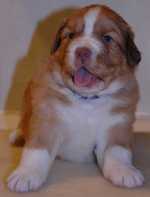 At Tollchester, our puppies are weaned onto the raw diet (BARF) as well as kibble dog food for optimum health, nutrition and development. We are not purists with the raw diet and all of our toller pups will be introduced to kibble prior to leaving to their new homes. This diet makes our puppies flexible on diet when going to their new home; some owners choose 100% raw food, some choose 100% kibble and some choose a combination diet.
At Tollchester, our puppies are weaned onto the raw diet (BARF) as well as kibble dog food for optimum health, nutrition and development. We are not purists with the raw diet and all of our toller pups will be introduced to kibble prior to leaving to their new homes. This diet makes our puppies flexible on diet when going to their new home; some owners choose 100% raw food, some choose 100% kibble and some choose a combination diet.
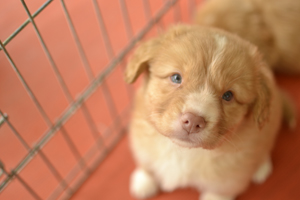 All our puppies are sent home with an 8 week DAPP vaccine. At Tollchester we recommend Recombitek Vaccines and IMRAB TF Rabies Vaccines. We also recommend not to do your Rabies vaccine with any other vaccine. Tollers are a breed who can be sensitive to vaccinations including anaphylatic shock and immune mediated reactions to vaccines that can be fatal. Therefor, for this reason we encourage limited vaccines and specific types of vaccines with ANY toller puppy. For more information on vaccine types visit the AAHA website at https://www.aaha.org/aaha-guidelines/vaccination-canine-configuration/vaccine-types/
All our puppies are sent home with an 8 week DAPP vaccine. At Tollchester we recommend Recombitek Vaccines and IMRAB TF Rabies Vaccines. We also recommend not to do your Rabies vaccine with any other vaccine. Tollers are a breed who can be sensitive to vaccinations including anaphylatic shock and immune mediated reactions to vaccines that can be fatal. Therefor, for this reason we encourage limited vaccines and specific types of vaccines with ANY toller puppy. For more information on vaccine types visit the AAHA website at https://www.aaha.org/aaha-guidelines/vaccination-canine-configuration/vaccine-types/
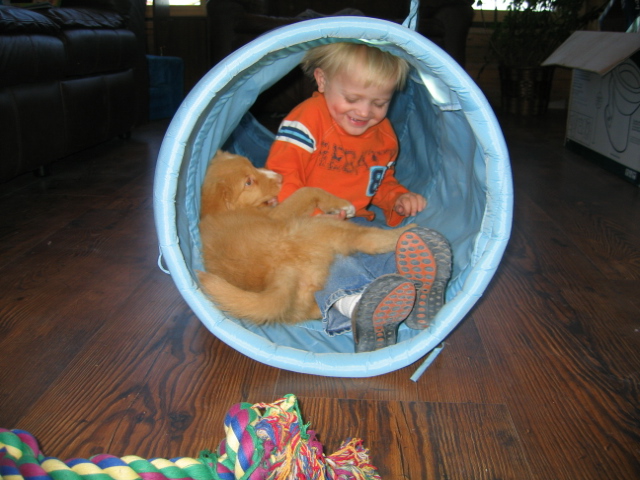 We strongly believe, breeding should be left to the fanciers who are dedicated to improving their breed. We are advocates about "spaying and neutering your pet" and believe puppies should be spayed prior to 3 years of age who are not used in a registered breeding program. There are a few programs that will neuter/spay puppies as young as 6weeks of age. http://www.danesonline.com/earlyspayneuter.htm for more information on altering a puppy while they are immature. Keep in mind 'early neutering and spaying' in many sports enthusists opinion is alteration before full sexual maturaty (average is 12-18 months in tollers). For information regarding the pros and cons of neutering after sexual maturity check out http://www.caninesports.com/uploads/1/5/3/1/15319800/spay_neuter_considerations_2013.pdf . Each owner is encouraged to do what they feel is best for their family and dog. Research your options, discuss your choices with your breeder and evaluate the puppy whom the decision is being made for to make the choice that is right for you. I personally suggest waiting until your puppy is over 12 months to provide your puppy with the optimum maturity for bone developement. A good article outlining the reasons for "rethinking spaying or neutering" is http://www.doglistener.co.uk/neutering_definitive
We strongly believe, breeding should be left to the fanciers who are dedicated to improving their breed. We are advocates about "spaying and neutering your pet" and believe puppies should be spayed prior to 3 years of age who are not used in a registered breeding program. There are a few programs that will neuter/spay puppies as young as 6weeks of age. http://www.danesonline.com/earlyspayneuter.htm for more information on altering a puppy while they are immature. Keep in mind 'early neutering and spaying' in many sports enthusists opinion is alteration before full sexual maturaty (average is 12-18 months in tollers). For information regarding the pros and cons of neutering after sexual maturity check out http://www.caninesports.com/uploads/1/5/3/1/15319800/spay_neuter_considerations_2013.pdf . Each owner is encouraged to do what they feel is best for their family and dog. Research your options, discuss your choices with your breeder and evaluate the puppy whom the decision is being made for to make the choice that is right for you. I personally suggest waiting until your puppy is over 12 months to provide your puppy with the optimum maturity for bone developement. A good article outlining the reasons for "rethinking spaying or neutering" is http://www.doglistener.co.uk/neutering_definitive
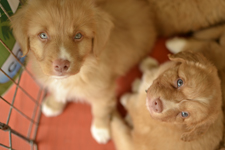 All toller puppies are sold with a comprehensive written sales contract which includes a lifetime of help, advice and assistance to all our puppy buyers! Puppies are tattooed/micro-chipped and registered with the Canadian Kennel Club.
All toller puppies are sold with a comprehensive written sales contract which includes a lifetime of help, advice and assistance to all our puppy buyers! Puppies are tattooed/micro-chipped and registered with the Canadian Kennel Club.
Most of our puppy's are sold on a non-breeding agreement, if you wish to breed this can be lifted later or agreed upon before pick up; breeding prospects placed onto a co-ownership breeding contract with us, passes all health clearances and meets the breed standard. All pet puppies that are not going to be used for show or breeding must be spayed or neutered by 3 years of age and are not to be bred prior.
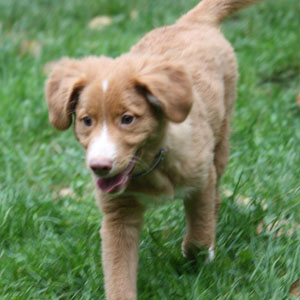 Each toller puppy will be sent home with an inclusive puppy package with parent’s pedigrees, training/grooming tips, information about your puppy, a copy of our agreement/contract, and food/toys/bowls/leash/collar to help get you started.
Each toller puppy will be sent home with an inclusive puppy package with parent’s pedigrees, training/grooming tips, information about your puppy, a copy of our agreement/contract, and food/toys/bowls/leash/collar to help get you started.
Our Nova Scotia Duck Tolling Retrievers are available to approved homes only! Once we have received your toller application we will contact you to set up an interview. We encourage you to come and visit our home and our dogs. If you are approved for our waiting list you will be kept up to date with current litters, future plans and any references of puppies currently available. When a litter is bred at Tollchester and a breeding is confirmed you will be contacted in regards to our litter waiting list. If you wish to be placed onto our litter waiting list a deposit will be requested to hold a spot on this list. Final payments must be made prior to picking up your puppy are payable in US funds for US and Foreign residents and Canadian Funds for Canadian residents. Waiting list for a litter can range between a few weeks to a few years depending on the individual needs of the person and puppy.
 Finding the right home for the right puppy is one of our highest priorities. As the breeder we always reserve the right to choose which puppy goes to which home. When the litter is born evaluations start instantaneously. After 8 weeks of observation, a 6 week trainability test, a 7 week temperament test, a 8 week structure evaluation, a vet check and our puppy play day evaluation your puppy will be chosen for you with your input. If for some reason a suitable puppy is not available for you, you will have the choice of the following litter.
Finding the right home for the right puppy is one of our highest priorities. As the breeder we always reserve the right to choose which puppy goes to which home. When the litter is born evaluations start instantaneously. After 8 weeks of observation, a 6 week trainability test, a 7 week temperament test, a 8 week structure evaluation, a vet check and our puppy play day evaluation your puppy will be chosen for you with your input. If for some reason a suitable puppy is not available for you, you will have the choice of the following litter.
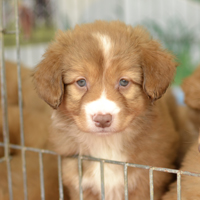 All show/performance prospect puppies are chosen first and take priority over pet puppies. This is because of the special requirements a show/performance puppy has. Show/performance puppies are placed in serious show/performance homes.
All show/performance prospect puppies are chosen first and take priority over pet puppies. This is because of the special requirements a show/performance puppy has. Show/performance puppies are placed in serious show/performance homes.
If you would like to meet our dogs in person, visits to our home are welcomed, but are on an appointment only basis.
